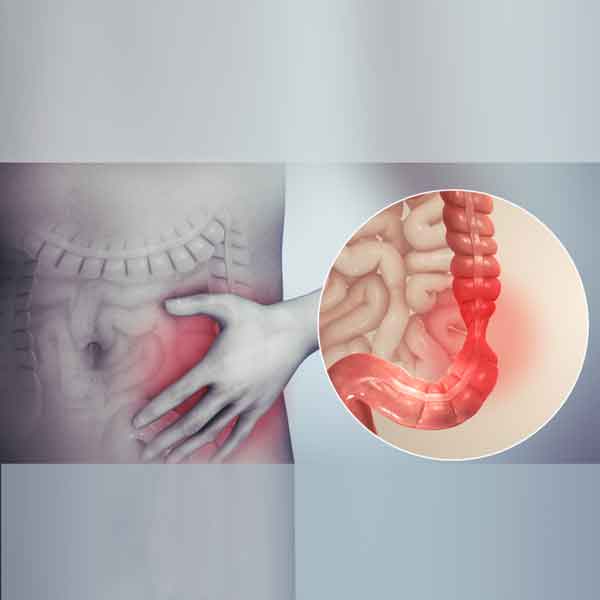IBS stands for Irritable Bowel Syndrome. IBS is a very common disorder that affects the large intestine. IBS affects 3-20% of the US population, depending on ethnicity, gender, communication abilities, education, financial and coexisting medical conditions. Luckily IBS doesn’t cause changes in bowel tissue or increase a person’s risk of colorectal cancer, yet in rare cases IBS can cause intestinal damage.
Other names for Irritable Bowel Syndrome are: spastic colon, irritable colon, mucous colitis, and spastic colitis. IBS is a different condition than Inflammatory Bowel Disease in that a disease is a separate diagnosis with a treatment, and a syndrome is a collection of ongoing symptoms that don’t necessarily have one cause or cure.
The signs and symptoms of Irritable Bowel Syndrome vary from minor to being a significant disruption to daily life. These symptoms are not always constant in everyone, however some people have more perpetual symptoms. The most common symptoms of IBS include:
- Abdominal pain, cramping or bloating that is usually at least partially relieved by passing a bowel movement
- Excess gas
- Diarrhea or constipation, sometimes alternating bouts of both
- Mucus in stool
Medical professionals can’t pinpoint a precise cause of IBS, however there are factors that are related to IBS:
Muscle contractions in the intestine can cause stress. If the muscle contractions are too strong or last too long, this causes gas, bloating and diarrhea. If muscle contractions are not strong enough it can slow down the process of food passage which can lead to dry stools.
Nervous System Abnormalities can cause poor communication between your brain and intestines; this in turn, may cause cause pain, gas, diarrhea or constipation.
Inflammation in the intestines can cause IBS. Some people have more immune-system cells in their intestines which causes pain and diarrhea.
Severe infections can cause IBS. IBS is associated with extra bacteria in the intestines.
Changes in gut bacteria, called microflora can cause IBS. It has been found that the microflora (good bacteria) in people with IBS might be different from healthy people.
IBS tends to happen more frequently in people under the age of 50. There may be a genetic link to people with IBS, since it tends to run in families. People with mental health issues often have IBS symptoms. Having a history of trauma and abuse, whether it was sexual, physical or emotional, tends to lend itself to Irritable Bowel Syndrome.
IBS affects people many ways. People with IBS tend to have 3 times more sick days used because of their symptoms. This can cause stress in itself, however the things that happen to your body when you have IBS can cause depression and anxiety, which in turn make symptoms worse. Some people can get relief through counseling that helps people learn better ways to handle stress and relax, which can lead to less symptoms.
IBS can be triggered by food, stress and hormones. Many people experience worse symptoms of IBS when they eat foods like: wheat, dairy products, citrus fruits, beans, cabbage, milk and carbonated drinks. People with IBS tend to see more severe symptoms when they are going through moments of high stress. Medical professionals think their is a link between hormones and IBS since women have double the chance of having IBS over men and these symptoms increase during a woman’s menstrual cycle.
Things You Can Do to Relieve Symptoms of IBS
There are lifestyle changes that you can make to decrease the inflammation in your body including:
- Commit to a regular workout routine
- Cut back on caffeinated beverages that stimulate the intestines
- Eat smaller meals
- Minimize stress (seeing a therapist is a good suggestion)
- Take a probiotic to increase the “good” bacteria in your gut
- Avoid fried and spice food
When Should You See Your Doctor
It is important to let your doctor know what is going in your body. If you are experiencing changes in your bowel movements or other more serious symptoms it could be a more severe condition, like colon cancer. Please see your doctor as soon as possible if you experience the following symptoms:
- Unexplained weight loss
- Diarrhea at night
- Rectal bleeding
- Iron deficiency; anemia
- Unexplained vomiting
- Difficulty swallowing
- Persistent pain that isn’t relieved by passing gas or a bowel movement
If you are needing help creating a comprehensive wellness plan please Contact Wellness Works NW. Text or Call us at 360-447-8061 to schedule a free consultation. During this time of quarantine Karen is meeting with people online via several online platforms for counseling and workout routines, she will be glad to make an appointment to talk with you.
I hope this article answered questions you had and was easy to understand. If you would like us to write about a particular topic that you can’t find on this site, please send us an email on our Dear Jamie page and someone from Our Team will be glad to research and write about your topic.
Resources and Start Learning More:
- Defining Comorbidity: Implications for Understanding Health and Health Services by Jose M. Valderas, MD, PhD, MPH, Barbara Starfield, MD, MPH, Bonnie Sibbalkd, MSc, PhD, Chris Salisbury, MB, ChB, MSc, FRCGP, and Martin Roland, CBE, DM, FRCGP, FRCP, FMedSci for US National Library of Medicine National Institutes of Health
- Everything You Want to Know About IBS by Jaime Herndon and Tricia Kinman, medically reviewed by Daniel Murrell, MD for HealthLine
- Irritable bowel syndrome by Mayo Clinic Staff
- Irritable bowel syndrome: epidemiology, diagnosis and treatment: an update for health-care practitioners by O. Grundmann and SL Yoon for US National Library of Medicine National Institutes of Health
- What Exactly Are Syndromes? An Interview with Dr. Kirtly Jones for The University of Utah
Related Articles
- Learning About Colorectal Cancer
- How to Pick Your Probiotic Supplement
- Living with Central Sensitization Syndrome More Commonly Referred to as Fibromyalgia
- Be Your Own Advocate
- Learning About Vitamin D
I hope this article helps Fuel Your Wellness. Please leave your comments below.
 Summer D Clemenson co-owns Clemenson Enterprises and Wellness Works NW with her wife, Karen G Clemenson. Their personal motto is Creativity, Honesty & Positivity are a must! This mantra helps them stay community and wellness minded in all they do. Summer is an Independent Wellness Advocate at dōTERRA. Summer also writes poetry and inspirational blogs @ ClemensonEnterprises.com. Her crochet art can be viewed and purchased @ KnottyWares.com & she loves special orders!
Summer D Clemenson co-owns Clemenson Enterprises and Wellness Works NW with her wife, Karen G Clemenson. Their personal motto is Creativity, Honesty & Positivity are a must! This mantra helps them stay community and wellness minded in all they do. Summer is an Independent Wellness Advocate at dōTERRA. Summer also writes poetry and inspirational blogs @ ClemensonEnterprises.com. Her crochet art can be viewed and purchased @ KnottyWares.com & she loves special orders!













